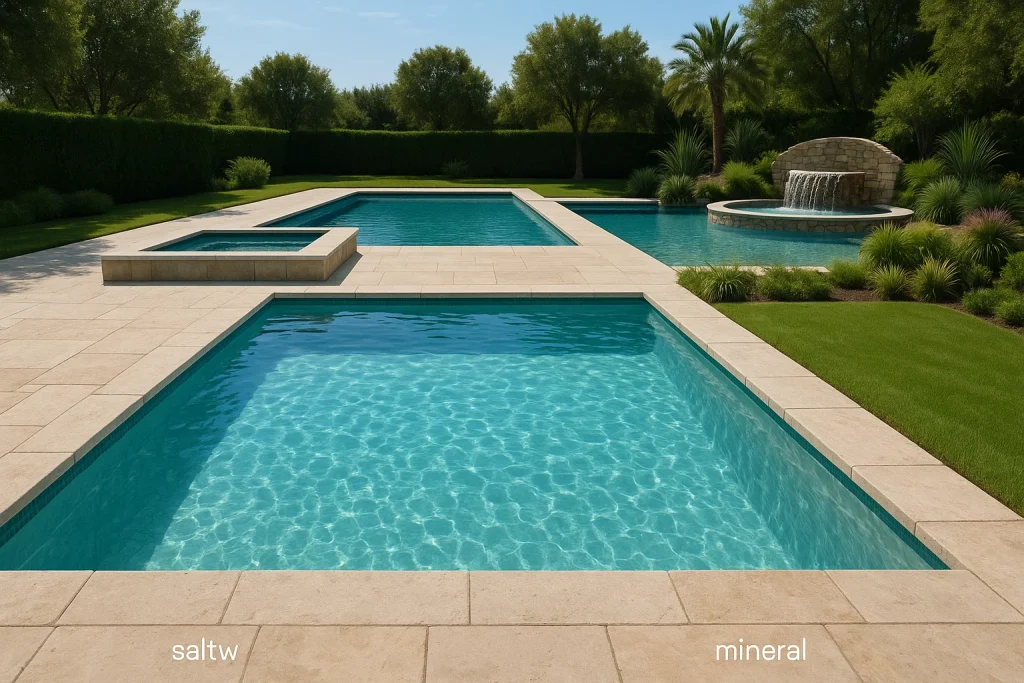
The Pros and Cons of Different Pool Water Systems
Choosing the right water system for a pool isn’t just about clarity or sparkle — it’s about finding the right balance between maintenance, comfort, and long-term costs. Different systems offer distinct advantages, and understanding the key differences can help homeowners make informed decisions.
Let’s explore the most popular pool water systems and weigh their pros and cons.
Traditional Chlorine Pools
Overview: Traditional chlorine pools use chemical chlorine to disinfect water, keeping it free of bacteria and algae.
Pros:
- Highly effective at killing bacteria and algae.
- Familiar and widely available.
- Lower initial setup cost compared to alternatives.
- Works well in all climates.
Cons:
- Regular manual chemical balancing required.
- Can cause eye irritation and dry skin.
- Strong chlorine smell can be unpleasant.
- Chemicals must be stored and handled carefully.
Saltwater Pools
Overview: Saltwater pools use a salt chlorine generator to produce chlorine from salt, providing a softer, more natural swimming experience.
Pros:
- Softer water feel on skin and eyes.
- Less harsh chlorine smell.
- Lower ongoing chemical costs.
- Gentle and often preferred by people with sensitive skin.
Cons:
- Higher initial installation cost (generator system).
- Salt can be corrosive to pool fixtures over time.
- Still requires monitoring and occasional manual intervention.
Mineral Pools
Overview: Mineral pools use minerals like magnesium, copper, and silver to reduce bacteria and algae, minimizing the need for chlorine.
Pros:
- Silky, soft water feel.
- Lower chlorine levels needed.
- May offer therapeutic benefits for skin and muscles.
- Reduced chemical odor.
Cons:
- Higher upfront costs for mineral systems.
- Minerals must be replenished periodically.
- May still require backup chlorination during heavy usage.
Bromine Pools
Overview: Bromine is another sanitizer that works similarly to chlorine but is often used in indoor pools and spas.
Pros:
- More stable in warm water (ideal for spas).
- Less pungent odor than chlorine.
- Continues to sanitize even after bonding with contaminants.
Cons:
- More expensive than chlorine.
- Breaks down faster under direct sunlight.
- Can cause more staining in waterlines and equipment.
Ozone and UV Systems
Overview: These advanced systems use ozone gas or ultraviolet light to kill bacteria and viruses, significantly reducing the need for chemical sanitizers.
Pros:
- Drastically reduces chlorine or bromine usage.
- Highly effective at neutralizing contaminants.
- No residual chemical smell.
- Environmentally friendly.
Cons:
- Expensive initial setup.
- Requires backup sanitization (usually low-level chlorine or bromine).
- Equipment maintenance and repair can be costly.
Final Thoughts
No single pool water system is perfect for everyone. It comes down to personal priorities: budget, comfort, maintenance preferences, and even aesthetic concerns. Traditional chlorine remains reliable and affordable, while saltwater offers a gentler touch. Mineral pools deliver luxury, bromine shines in hot water environments, and ozone/UV systems lead the way in cutting-edge sanitation.
Choosing wisely ensures every swim is refreshing, safe, and exactly the experience homeowners dream of.
Which system fits your lifestyle best? The perfect pool experience starts with the right choice.
